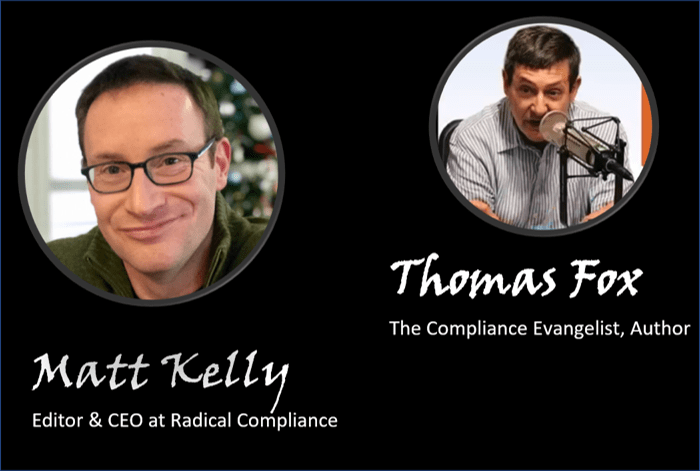Countdown to 500 – Matt Kelly on the Evolution of Business Reporting on Compliance
By Thomas Fox ,The Compliance Evangelist, Author
We are on the final countdown to Number 500. Next week, on Monday, August 31,
I will be celebrating my 500th Anniversary episode, where I will talk about some of the key changes
I have seen in compliance over the past 10 years, plus highlights from some of my 500 podcasts.
Today on the FCPA Compliance Report, I post Episode 496, which is an interview with Matt Kelly , Editor & CEO at Radical Compliance.
Matt and I take a look back at Foreign Corrupt Practices Act (FCPA) enforcement over the past 10 years or so. Kelly’s interview is part of a special series of podcasts over this week where I talk to a noted compliance commentator about how they have seen compliance develop over the past 10 years or so.
I began by asking Kelly
what has he observed in the evolution of how the business press has viewed compliance?
He said, “a couple of things come to mind, from that perspective of being a journalist who writes about this more than being a compliance professional, who does it.”
Kelly said the first is, “I have been struck foremost by the way that corporate compliance has sort of moved into the mainstream of business news, at least in discussion about business.”
This was not the case when Kelly began his journalism career and not even the case 10 years ago. Of course, those who paid attention to corporate compliance understood what corporate compliance was, but once you got outside of that group, “a lot of people wouldn’t understand really what compliance was or this has big implications for corporate compliance.” Kelly believes this “has very much changed today, especially among the white-collar world.”
Now, even if you are not in corporate compliance or a second line of defense function, Kelly believes most sales executives, R&D and marketing people, would all understand what corporate compliance is. More significantly,
“they understand that it matters and that cannot be ignored.”
It is no longer the situation where someone says, “I just see the compliance person walking up and down the hall once a month. Corporate compliance has injected itself into the conversation in the halls of corporate power, I think that’s a big, big change. It’s much more mainstream now.”
Media perspective
The second thing that sticks out to Kelly from a media perspective is
“how social media has actually let many more people debate corporate ethics and compliance issues, even if they don’t necessarily know all of the nuance of it. It is very easy to pick out what you think a corporate ethics scandal is, talk about it on social media and you come up with a clever hashtag and then suddenly it’s off to the races.”
Kelly went on to note, “now all of these other stakeholders that companies might not have had to worry about before or not take as seriously before now, they do have to take them seriously.”
This is because social media has democratized other people’s ability to hold companies accountable to ethical standards. Moreover, “social media allows people to find other likeminded people and form alliances. If the alliance is efficiently strong, it can take on corporations and occasionally get the corporations to bend to their will.”
The last point speaks to the amplification aspect of social media. It can move a message literally around the world. Kelly believes that on a practical level it means information can spread quite rapidly. This in turn creates a pressure where companies are required pay more heed to what their ethical values and their priorities are. A company that cannot build that vision, framework and focus will constantly be responding to other distractions on social media rather than pursue their strategies.
This means that your organization is “going to be pulled in a zillion different directions every day by somebody else because of this ethics issue or that ethics issue, or this group over here, that resents what you’re doing. Then your business model is responding to noise. And, spoiler alert, responding to noise is not a viable business model.”
Looking down the road a bit, Kelly sees the convergence of compliance and ethics with audit and risk management into a more holistic risk management structure in corporate America.
COVID-19 has emphasized the need for more information about emerging risk and the ability to monitor when a risk drifts into the red zone. Internal audit talks about data analytics. From there you can quite quickly spot if there is a strange pattern in the invoicing or purchase orders. Compliance and ethics can then move into and remediate as their part of the equation.
I hope you will listen to the full podcast to hear about these issues and many more from Matt Kelly.
Also please plan to join me tomorrow, where I visit with Jonathan Armstrong, founder Partner at Cordery Compliance, on changes in compliance from GDPR, UKBA and the Modern Slavery Act.
- Core Investigative Due Diligence - June 3, 2021
- Preparing for the Next Crisis - May 14, 2021
- Using Data in Compliance - March 29, 2021


Stay connected